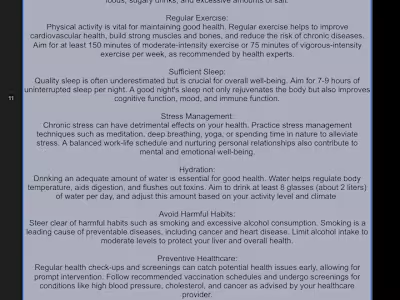Weight lose
/
Title: The Journey to Healthy Weight Loss
Introduction:
Weight loss is a topic that resonates with many people, whether it's for health reasons or personal goals. Achieving and maintaining a healthy weight is not just about looking good; it's about feeling great and reducing the risk of various health issues. In this article, we'll explore some effective strategies for safe and sustainable weight loss.
1. Set Realistic Goals:
Before embarking on a weight loss journey, it's crucial to set realistic and achievable goals. Unrealistic expectations can lead to disappointment and frustration. Aim for gradual and steady progress rather than rapid, unsustainable changes.
2. Balanced Diet:
Eating a balanced diet is paramount for weight loss. Focus on whole foods, including fruits, vegetables, lean proteins, and whole grains. Monitor portion sizes, and be mindful of calorie intake. Consider consulting a registered dietitian for personalized guidance.
3. Caloric Deficit:
To lose weight, you need to consume fewer calories than you expend. Create a caloric deficit by either eating fewer calories or increasing physical activity. A moderate calorie deficit of 500-750 calories per day can lead to a healthy weight loss rate of about 1-2 pounds per week.
4. Regular Exercise:
Incorporating regular physical activity is crucial for weight loss and overall health. Aim for a combination of aerobic exercises (e.g., brisk walking, cycling) and strength training to build muscle and boost metabolism. Find activities you enjoy to stay motivated.
5. Mindful Eating:
Practice mindful eating by paying attention to hunger cues and eating without distractions. This can help prevent overeating and promote healthier food choices.
6. Stay Hydrated:
Drinking water can help control appetite and support metabolism. Sometimes thirst is mistaken for hunger, so staying hydrated is important for weight loss.
7. Sleep Well:
Quality sleep is essential for weight management. Lack of sleep can disrupt hormones that regulate appetite and lead to poor food choices. Strive for 7-9 hours of restful sleep per night.
8. Manage Stress:
Chronic stress can lead to emotional eating and weight gain. Employ stress-reduction techniques like meditation, yoga, or deep breathing to manage stress effectively.
9. Patience and Persistence:
Weight loss can be challenging, and setbacks are normal. Stay patient and persistent, and don't be discouraged by temporary plateaus or minor setbacks.
10. Seek Support:
Consider joining a support group or enlisting the help of a healthcare professional or personal trainer. Support can provide motivation, guidance, and accountability.
Conclusion:
Weight loss is a journey that requires commitment, consistency, and a holistic approach. By setting realistic goals, making healthier food choices, incorporating regular exercise, and addressing factors like sleep and stress, you can achieve sustainable weight loss and improve your overall well-being. Remember that the goal is not just to shed pounds but to embrace a healthier lifestyle that you can maintain in the long term.
Like this project
Posted Sep 11, 2023
Certainly! Here are the key points for effective weight loss in short bullet points: - Set realistic goals. Etc
Likes
0
Views
1





